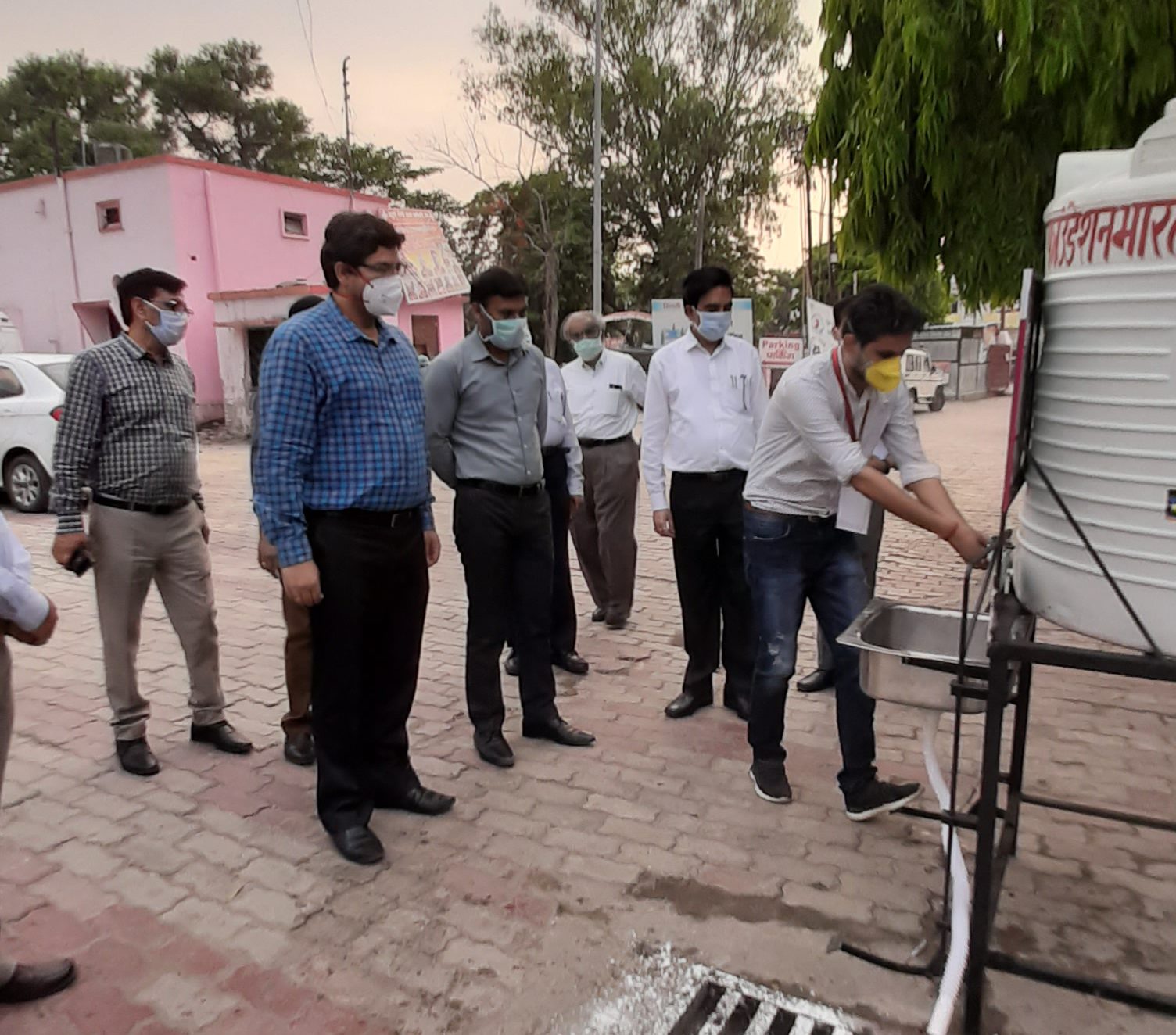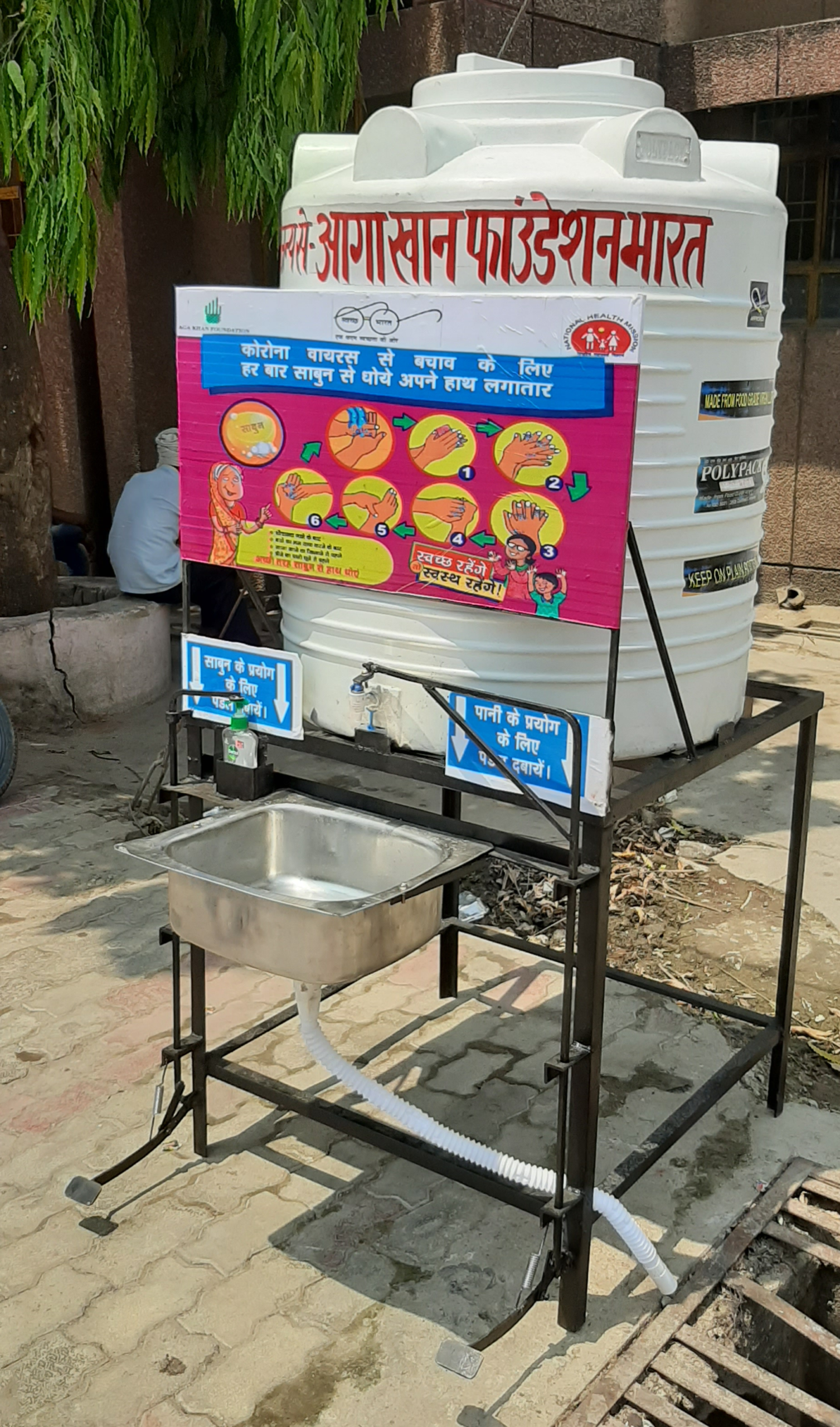Combating COVID-19 in Uttar Pradesh with ingenuity, innovation and compassion
Vivak Awasthi has been working with the Aga Khan Foundation’s WASH programmes for a number of years. Since the outbreak, he has used his expertise to help his community in a novel way.
When did you first hear about COVID-19? What did you think or feel at that time?
The news was everywhere when there was an outburst of the Coronavirus in China in January. It quickly spread to other countries and then the WHO declared a pandemic. This made me very worried because there was so much going on and my wife was heavily pregnant. On 20th February, I was blessed with a baby girl and somehow in that moment of bliss I forgot that coming days were going to be tough.
“Never in my life had I seen a time where I could not locate even a single person on the street in the evening.”
In March, all the schools closed down and companies were told to allow their workers to work from home. It became clear that we would have to really discipline ourselves and strictly stay at home. No one knew how long it would take to return to normal. Never in my life had I seen a time where I could not locate even a single person on the street in the evening. There was fear, anxiety, confusion and chaos all around, as people started stockpiling essentials items, and many nonessential items too. It was difficult to wrap your head around something like this which none of us had ever seen or experienced before.

How has COVID-19 had an impact on you and your community?
The government literature available around COVID-19 made it clear that children, elderly people and those with weak immunity are the most at risk, though everyone is suffering in one way or the other. Labourers, daily wagers and other lower-paid workers have been badly affected by the lockdown. Their survival was totally dependent on the money they earned daily. Many of them do not even know what safe hand-washing practice is or that they need to wear masks, and separately it has become very difficult for them to arrange food for their families. Even with some support through the government, many have been left with just their own survival skills and sheer luck of not getting infected to keep themselves and their families going.
“This outbreak has made us all rethink the lifestyles we are used to.”
For my experience, my job requires me to be in the field to provide technical support, but now I am having to work from home and so I miss my interactions with the beneficiaries. I am now providing support to district officials while coordinating over a phone which is quite a difficult task, though the government has issued passes if one needs to go out for some important work. This outbreak has made us all rethink the lifestyles we are used to.
How are you contributing to the fight against this pandemic? Why are you taking action?
I have been working in the development sector for over four years now. Over the years I have developed expertise in Water and Sanitation Hygiene (WASH) initiatives and my engagement with the Aga Khan Foundation has enhanced my capacity in multiple dimensions. As this pandemic has raised many concerns regarding public health and safety, maintaining WASH programmes has becomes an important way to combat COVID-19.
At the beginning of the lockdown, governments at various levels started engaging with civil societies strategically. Various brainstorming sessions were held with my team to discuss what our next steps should be. These were headed by our lead, Mr. Jairam Pathak, who is an expert in WASH programmes, and someone who has been an inspiration to me personally. Together we began exploring possible ideas that could help the community we worked with. We quickly realised that the availability of PPE was one major issue, and spreading awareness was also very important. I started designing awareness drives with support from the Panchayat raj Department, as well as helping to distribute PPE in Bahraich — these were later given to the frontline workers who have been the true warriors of this outbreak.

The satisfaction I received from this work motivated me to do more. Our team appreciated that innovative ideas were needed and this realisation ultimately led to us designing and creating a foot operated hand-washing station. A few members from the team and I consulted some friends, colleagues and seniors for feedback, and once the blue print was ready, I contacted some local carpenters to help create the prototype. I then arranged all the necessary material that was required to build the hand-washing station, which was actually quite a challenge since lockdown had meant that only essential items were available in the market. Finally, after struggling for two weeks, the hand-washing station was made exactly as we had wanted it to be. It is easy to use and has now been set up in a district hospital in Bahraich. This has helped many people daily and preventing them from the risk of contamination.
“For everyone out there, it is time for some introspection…though it is a health emergency on the surface, it has made us think about what aspects of our life are actually important and what need to change.”
What is one thing you would like to say to the rest of the world, about this global challenge we are all facing together?
Without any doubt I believe that we human beings have caused this pandemic. While we fight this global challenge together, there are many things that we need to revisit about how we live. We have seen how nature is healing in the temporary absence of humans. The pollution levels have fallen and the air is cleaner. Also, we have seen the crime rate decrease since everyone is now at home and worried about their immediate survival.
Of course not all aspects of this pandemic have been so positive. There are reports that cases of domestic violence have increased and some have even died from hunger, whilst those who are trying to save us do not have the required PPEs to protect them. Migrant workers, students, people who work away from their homelands, or were abroad when lockdown began, are all separated from their families who they need for support during this hard time.
For everyone out there, it is time for some introspection. We all are in this, fighting together with the same spirit and hoping for better days to come, and so we need to think hard about major reforms to certain polluting industries or about how our travel to work has been a source of pollution too, and how working from home has actually been a good thing for many sectors. Even though it is a health emergency on the surface, it has made us think about what aspects of our life are actually important and what need to change. We really need to value the health and the wellbeing of the society we are living in, as well as be compassionate towards each other irrespective of any social, economical, political, religious and personal differences.
Thank you Vivak.

Support our work Your donations are helping us build a future where we all thrive together.